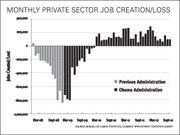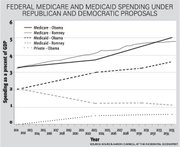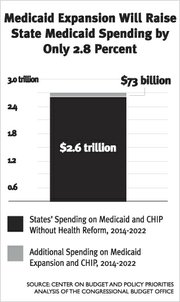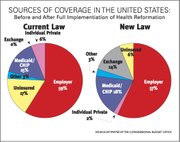Photo by Mike Day.
With less than a week before the presidential election, polls show the two frontrunners neck-and-neck in a campaign focused largely on health care and economic issues.
While the candidates are quick to tell us what their policy could mean for the entire country, the effects will vary from state to state and income to income.
That leaves many Mississippians wondering just how the candidates’ proposed policies will affect them.
On March 23, 2010, President Barack Obama signed the Patient Protection and Affordable Care Act into law, most of which the U.S. Supreme Court upheld June 28, 2012.
Despite the act’s close relation to the state health-care law Republican candidate Mitt Romney passed in Massachusetts, the former governor has made repealing and replacing PPACA one of the biggest focuses of his campaign. He says his Massachusetts law should be a model for other states, but that the federal government should not force states to adopt it.
One major change Romney’s running mate Paul Ryan proposes is turning Medicare, federal health insurance for senior citizens, into a voucher program for future enrollees. Under the proposal, seniors who become eligible for Medicare after the program’s implementation in 2023 would have the option to receive vouchers from the government, which they could spend on private health insurance. Seniors who prefer traditional Medicare would also have the option of the current public insurance plan as well.
While Romney has not come out in total support of Ryan’s plan, he says it is a step in the right direction.
Opponents of the plan say it could raise the price of traditional Medicare so high that it would effectively dismantle the program. A study by the Kaiser Family Foundation showed that in Mississippi, as many as 16 percent of those who chose to stay on traditional Medicare would see their premiums rise as much as $100 per month.
Using 2010 as a model, the study applied Romney’s proposed voucher plan to seniors on Medicare and private insurance plans. On a national average, annual premiums for those on traditional Medicare would have gone up $720 under Ryan’s plan. For those on private insurance, 88 percent would have paid higher premiums if they stayed on the same plan.
Corey Wiggins, program manager at the Mississippi Health Advocacy Program, said the voucher program would likely leave only the most unhealthy seniors, who were unable to find affordable coverage in the private sector, on traditional Medicare.
“The reason you get higher rates is because with health insurance, the way you bring down costs is when you have a nice mix of people in a group plan and group insurance,” Wiggins told the Jackson Free Press.
“You think about Medicare as group insurance. If you have that group, and you end up with people who couldn’t get insurance in the private market, and they buy back into Medicare, then you more likely will have people termed as ‘high utilizers.’ They are sicker, they are going to use the health insurance more. When you have that, that’s going to increase the premium rates, just because the system itself is paying more money out.”
Marty Wiseman, director of the John C. Stennis Institute of Government and Community Development, said Ryan’s voucher program is scary for future generations of Medicare recipients.
“For example, I am a diabetic who takes five shots a day,” Wiseman told the JFP.
“I would hate to have been self-employed or a farmer or whatever, and reach the age of 65 and be handed a voucher for X amount of dollars and no more, and have to go out on the insurance marketplace at the age of 65 and negotiate for an insurance contract. I fear for what the results of that would be. I’m sure it would not be something I could afford, if I could find insurance.”
Ryan has proposed putting the voucher system into effect in 2023. The point of that, Wiseman said, is to not upset those who are currently on Medicare or will be eligible in the next decade.
“The assumption is: ‘We will protect the folks age 55 and older. They are the ones that would raise the greatest hue and cry about it. Those under 55 are not close enough to worry about it, yet, and by the time we get it all in place, then they will be reaching that point,’” Wiseman said. “‘If we could just set it up and get it in place, then we’ll let that take care of itself.’ That is not satisfactory to me. The voucher scares me to death.”
Romney has vowed to return control of the health-care industry to the states, including whether states will allow insurance providers to deny coverage to people with pre-existing conditions.
During the first presidential debate, Romney said, “pre-existing conditions are covered under my plan.” However, his advisers admitted after the debate that they are, in fact, not covered under Romney’s plan. It would be up to the states.
Taxing the Rich
Another key issue that will hit the pocketbooks and pantries of Mississippians is the candidates’ proposals for the Bush-era tax cuts.
Neither candidate has proposed allowing the national debt to continue growing on its current path. So the question is how they plan to get the nation’s income moving in the other direction. Romney is refusing to use tax increases on the wealthy to create more federal income, or lower the debt, while Obama wants to see the wealthiest pay more on income over $250,000.
President Obama wants to see the taxes on the wealthiest Americans go back to levels before the George W. Bush-era tax cuts. In 2008, one-third of the nation’s 400 highest-income taxpayers paid 15 percent or less in federal taxes. Obama proposed the Paying a Fair Share Act this year, which would impose a 30 percent tax rate on those earning $1 million or more annually, the top 0.3 percent of the nation’s taxpayers.
Romney strongly opposes raising the taxes on the wealthy, and proposes across-the-board tax cuts, including a 20-percent cut in marginal rates for everyone. According to 2008 U.S. Census Bureau numbers, 39,270 Mississippians qualified as millionaires. That’s 21.5 millionaires per 1,000 households in the state, the lowest rate in the country. He also wants to keep the current tax rates on interest, dividends and capital gains, all of which are forms of income that come from investments. Because wealthy stockholders receive the majority of investment income, a rise in those tax rates would affect only a small percentage of Mississippians.
The Republican candidate says the Bush-era tax cuts help create jobs in the private sector. His logic is that more money in wealthy taxpayers’ pockets means they will use that money to create new jobs. His opponents want to know where the evidence of that is.
The evidence seems to show more that more money in the pockets of the rich does not result in a trickle down to the unemployed. In the era of the Bush tax cuts, unemployment rose from less than 6 percent in 2002 to more than 8 percent for most of the last four years.
Meanwhile, the average income of CEOs at major corporations was $9.6 million in 2011, up 6 percent from the previous year and the highest since the Associated Press began tracking the numbers in 2006.
CEO income doesn’t seem to only rise with the company’s bottom line, either. Executives earned 6 percent more than in 2010, despite corporate profits rising just 7.9 percent in 2011, compared to a 32.2 percent increase in 2010.
So while the wealthiest individuals at the nation’s major corporations are getting richer, they don’t seem to be creating more jobs for Americans.
While an end to tax cuts for the wealthiest taxpayers would only directly affect about 2 percent of Mississippi households, the cut to federal government programs would affect far more. Only West Virginia and New Mexico compare to Mississippi in amount of federal funding received versus federal taxes paid compared to the state GDP.
According to numbers collected by the U.S. Census Bureau and the IRS, from 1990 through 2009, Mississippians paid $164.7 billion in federal taxes. The state took in $404.6 billion in federal funding, or $239.9 billion more than the state put in. That is 254 percent of the state’s GDP of $94.4 billion over that period.
Of all 50 states, only New Mexico’s 261 percent of state GDP ranked higher than Mississippi.
Undoubtedly, most in the state would see the effects of federal tax cuts in the form of cuts to public programs more so than their pocketbooks.
“We’re already needing more in the way of federal money than we’ve gotten in the past,” Wiseman said.
“You begin cutting now with a meat ax, and the federal programs that Mississippi was a heavy participant in—whether it’s education, Pell grants, student loans, whatever area—Mississippi will feel it more, because we depend more on federal dollars than other states. What does that mean? It means Mississippi is going to have to look at its own budget and its own revenues and resources and decide which programs that we want to take over from the federal government and which we want to simply go out of existence and do without.”
Education
Romney has approached education in much the same way as the rest of his campaign: with more rhetoric than specific, defined policy. One talking point he has pushed for children, especially those from low-income families and those with disabilities, is to have the option to attend schools outside their geographical district. He’s proposed that the government provide funding for those children to attend another school.
While the concept of choice looks good on paper, opponents say many qualified children in Mississippi wouldn’t be able to afford to go to another school.
Carolyn Jolivette, executive director of Parents for Public Schools of Jackson, said one of the biggest obstacles, especially for children from low-income families, would be reliable transportation to and from a school outside their district.
“I think we have to look at: Is it really ‘choice’?” Jolivette asked. “What happens if you can’t meet the demands? If every parent decided that they wanted their child to go to another school, what does that mean if you can’t meet those demands? I’m not sure how realistic that is, given where we are today in today’s economy.”
Maria Ferguson, executive director of the Center on Education Policy in Washington, D.C., said though Romney hasn’t used the word “voucher,” that is essentially how he is proposing to fund students crossing district lines. Very few areas of the country have attempted similar voucher programs in education, she said, and none have produced any data that shows it is a viable concept.
“It’s a fairly unrealistic proposal just because of the way the current system is set up, and (Romney) has put no detail to it to help us understand how he would overcome the fact that the current system is in no way set up to handle that,” Ferguson said.
Higher education presents another big divide between Obama and Romney. As a part of the Affordable Care Act, Obama signed a law that gave the federal government direct control over student loans for higher education. In Obama’s words, that will essentially “cut out the middle man,” bypassing the banks.
Under the Obama administration, student-loan debt repayment requirements dropped to 10 percent of discretionary income, and the government forgives the debts after 20 years. Obama has spoken about further changing the debt forgiveness laws, including allowing student-loan debt to be forgiven when individuals file bankruptcy, which now does not affect student loans.
Romney, who has run on a platform of pro-private business, has said that he will bring private lenders back into the student-loan process, which he claims will drive down interest rates and costs to students.
With 54 percent of Mississippians who graduate college having student-loan debt, policy on repaying those loans is affecting a growing number of citizens every year.
Obama’s income-based repayment plan has lowered payments for nearly 1 million graduates, but progress adoption has been slower than initially hoped.
One issue that may proportionately affect Mississippi more than any other state is the candidates’ stance on community colleges. With 15 community and junior colleges in the state, a large number of Mississippians depend on adequate funding at the two-year schools to keep tuition low and quality of education high.
In 2010, Obama signed the Health Care and Education Reconciliation Act into law, which provided $2 billion over four years to community colleges and career training programs. The goals of the law were to help colleges create relationships with businesses and colleges, teach basic skills and develop better online courses.
“I always refer to (community colleges) as the workhorses of the American higher-ed system,” Ferguson said. “This (funding) is long overdue. These community colleges are ground zero for a lot of low-income students. So a lot of people who lost their jobs during the recession and now need to go back and get new skills, usually the community colleges are the first place they go.”
Romney has not addressed community colleges much, if any, on the campaign trail. Ferguson believes that further shows his disconnect to the people.
“I think what some people are put off by are some of Romney’s sound bites about higher ed are the ideas that if students need more money, they should just ask their parents or they should shop around for more affordable schools,” Ferguson said.
With more than half of Mississippi college students using student loans to pay for school, it seems not everyone can afford to pay for their children’s college out of pocket.
Boosting Business, Creating Jobs
Both candidates in this election talk big when it comes to small business. Before voters can understand how potential policy may affect small business, though, they first need to define just how big these “small” businesses are.
The candidates use the Small BusinessAdministration’s definition of small business, which defines it as a company with 500 or fewer employees. Under that definition, 99.7 percent of the approximately 6 million businesses nationwide are small businesses. More than half those businesses, 3.7 million of them, employ four or fewer employees, and 4.7 million employ 10 or fewer.
Mississippi ranks No. 17 nationally with 16.2 percent of the labor force owning a micro-enterprise, a company which requires $35,000 or less in start-up funds and employ five or less people. Eighty percent of those businesses employ a single owner/operator, and they make up the majority of Mississippi small-business owners.
Only 1.39 percent of the Mississippi workforce owns a business that employs between six and 100 workers. That puts Mississippi No. 36 out of 50 states in that category.
It seems in every ad or debate claim made by these two candidates, there’s a bit of truth and bit of not-quite-truth. For every “yes,” there’s a “but,” especially when it comes to the candidates’ track records on small business and job creation.
For example, some Romney ads claim that as governor, “Romney reduced unemployment to just 4.7 percent.”
While the unemployment rate did drop under Romney’s watch, it went from slightly below the national average when he took office to about the same as the national average when he left.
In the final presidential debate, President Obama said that when Romney was governor, Massachusetts ranked 48 out of 50 states in small business development. Those numbers came from comparing Bureau of Labor statistics between 2002, the last year before Romney took office, and 2006, the last year he was in office.
Obama’s campaign compared private-sector startups and closings from the two years. While the national average rose 7.4 percent from 2002 to 2006, Massachusetts business startups fell 9.6 percent.
The Romney campaign responded with numbers from a Kauffman Foundation study that compared entrepreneurial startup from 1996-1998 with those from 2005-2007. That study, which unlike Bureau of Labor statistics included self-employed people starting businesses and unincorporated businesses, ranked Massachusetts as the fourth-highest state in entrepreneurial activity over that time period.
When you directly compare the two candidates’ policies, it seems that their plans might work best together, with Obama’s plan creating jobs in the short term, and Romney’s aiming to help employment in the future.
Obama signed the American Jobs Act in 2010, which immediately put Americans back to work. The act cut the payroll tax in half for a company’s first $5 million in payroll, a number that 98 percent of businesses do not reach annually. It also eliminated payroll tax on increased payroll up $50 million for companies that hired new workers or gave raises to current employees.
The bill also provided $5,600 to $9,600 in tax credits for companies that hired unemployed military veterans and invested large sums in infrastructure projects, such as rebuilding interstate highways, which has created thousands of jobs.
Romney’s proposed policy focuses more on the long term, with talking points such as ramping up domestic energy production, cracking down on China, cutting corporate tax rates and creating better trade agreements with Latin America.
None of these points are quick fixes. Increased domestic oil production, trade negotiations with China, new trade deals in Central and South America and rewriting tax codes all take time.
Obama, however, has already begun to make some of changes in his first term that Romney proposes. While Romney would point out that the increase is on private land, not public, U.S. domestic oil production is up more than 700,000 barrels a day since Obama took office in January 2009.
As for China, President Obama brought a trade case against China to the World Trade Organization over China’s practices creating cheap exports in the auto part manufacturing industry that threaten U.S. jobs among other cases.
WTO cases often take more than a year to complete, so the case is not likely to make a difference prior to 2013, but it shows that Obama has taken action to back his words about cracking down on Chinese trade practices.
Furthermore, Obama has proposed ending tax breaks for company which ship jobs to other countries, like China, and replace them with tax credits for company which create manufacturing jobs here in the U.S.
While Romney talks tough on China, his former company Bain Capital often took advantage of tax incentives and the workforce that came with shipping U.S. jobs to countries with like China, which has little labor regulation. (Bain, which Romney started, continues to close plants in the U.S. and move jobs offshore.)
Another major difference in the plans coming from the right and left is how the candidates plan to pay for their plans. Obama has made it clear that he wants to end tax cuts for the wealthiest Americans to help pay for his plan. Romney, on the other hand, strongly opposes raising taxes on the rich. He has said that once in office, he will evaluate every federal program to decide what is and is not necessary. Anything he doesn’t find necessary, he proposes cutting and handing to the states to fund or drop. Just what he plans to cut and whether that will pay for his policies is still a mystery.
In Mississippi, we’ve already seen Obama’s infrastructure investments creating jobs to repave and construct new interstate highways. If Romney becomes president, he will likely push for more offshore drilling in the Gulf, which could mean more jobs for Mississippians in the oil business, at least in the short term. However, the risk of oil spills and accidents concerns many residents.
In Mississippi, the numbers don’t lie. We are at or near the bottom of the nation in almost every sector, from health care and education, to personal income to employment. We’ll soon know which presidential candidate we will have to put our hope in for the next four years to improve our state and put us in a position to rise from the bottom of the barrel.
Read full election coverage at jfp.ms/election2012. You can reach Jacob Fuller at 601-362-6121 ext. 22 or email [email protected].











Comments